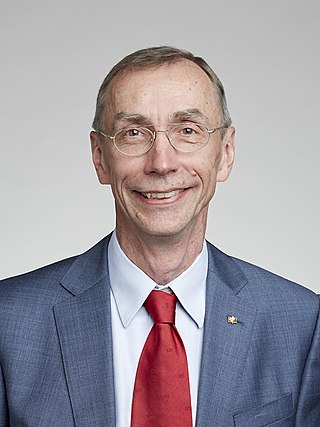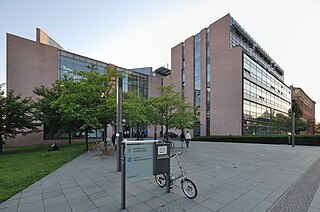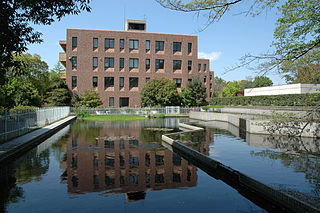Manfred Milinski (born 8 February 1950) is a German biologist who was Director of the Max Planck Institute for Evolutionary Biology.
He was born in 1950 in Oldenburg. He studied biology and mathematics in Bielefeld and Bochum, went to Oxford University on a Heisenberg Scholarship and in 1987 became Professor of Zoology and Behavioural Ecology at University of Bern. From 1999 to 2018 he has been Director and Scientific Member at the Max Planck Institute of Limnology, which in 2007 became the Max Planck Institute for Evolutionary Biology. He has been an Honorary professor at Kiel University since 2000. [1]
His main research fields are Co-operation, Sexual selection and Host-parasite co-evolution. He is a member of the Leopoldina and the Faculty of 1000. [2]
His publications include:

Svante Pääbo is a Swedish geneticist and Nobel Laureate who specialises in the field of evolutionary genetics. As one of the founders of paleogenetics, he has worked extensively on the Neanderthal genome. In 1997, he became founding director of the Department of Genetics at the Max Planck Institute for Evolutionary Anthropology in Leipzig, Germany. Since 1999, he has been an honorary professor at Leipzig University; he currently teaches molecular evolutionary biology at the university. He is also an adjunct professor at Okinawa Institute of Science and Technology, Japan.

The three-spined stickleback is a fish native to most inland and coastal waters north of 30°N. It has long been a subject of scientific study for many reasons. It shows great morphological variation throughout its range, ideal for questions about evolution and population genetics. Many populations are anadromous and very tolerant of changes in salinity, a subject of interest to physiologists. It displays elaborate breeding behavior and it can be social making it a popular subject of inquiry in fish ethology and behavioral ecology. Its antipredator adaptations, host-parasite interactions, sensory physiology, reproductive physiology, and endocrinology have also been much studied. Facilitating these studies is the fact that the three-spined stickleback is easy to find in nature and easy to keep in aquaria.

Martin Andreas Nowak is an Austrian-born professor of mathematics and biology at Harvard University. He is one of the leading researchers in evolutionary dynamics. Nowak has made contributions to the fields of evolutionary theory, cooperation, viral dynamics, and cancer dynamics.

Mate choice is one of the primary mechanisms under which evolution can occur. It is characterized by a "selective response by animals to particular stimuli" which can be observed as behavior. In other words, before an animal engages with a potential mate, they first evaluate various aspects of that mate which are indicative of quality—such as the resources or phenotypes they have—and evaluate whether or not those particular trait(s) are somehow beneficial to them. The evaluation will then incur a response of some sort.
H. Allen Orr is the Shirley Cox Kearns Professor of Biology at the University of Rochester.

The Max Planck Institute for Infection Biology (MPIIB) is a non-university research institute of the Max Planck Society located in the heart of Berlin in Berlin-Mitte. It was founded in 1993. Arturo Zychlinsky is currently the Managing Director. The MPIIB is divided into nine research groups, two partner groups and two Emeritus Groups of the founding director Stefan H. E. Kaufmann and the director emeritus Thomas F. Meyer. The department "Regulation in Infection Biology" headed by 2020 Nobel laureate Emmanuelle Charpentier was hived off as an independent research center in May 2018. The Max Planck Unit for the Science of Pathogens is now administratively independent of the Max Planck Institute for Infection Biology. In October 2019, Igor Iatsenko and Matthieu Domenech de Cellès established their research groups at the institute, Mark Cronan started his position as research group leader in March 2020. Silvia Portugal joined the institute in June 2020 as Lise Meitner Group Leader. Two more research groups where added in 2020, Felix M. Key joined in September and Olivia Majer in October, completing the reorganization of the Max Planck Institute for Infection Biology. Simone Reber joined as Max Planck Fellow in 2023 and now heads the research group Quantitative Biology.
Daven Presgraves is University Dean's Professor in the Department of Biology at the University of Rochester.
Tobias Bonhoeffer is a German-American neurobiologist. He is director of the department Synapses – Circuits – Plasticity and current managing director at the Max Planck Institute for Biological Intelligence in Martinsried near Munich.
William Martin is an American botanist and microbiologist, currently Head of the Institut für Molekulare Evolution, Heinrich Heine Universität, Düsseldorf.

The National Institute for Basic Biology (NIBB) is a research institute and post graduate university in Okazaki City, Aichi Prefecture, Japan. It was founded in 1977 to promote biological research in Japan in cooperation with public and private universities, and research institutes.

Günter P. Wagner is an Austrian-born evolutionary biologist who is Professor of Ecology and Evolutionary biology at Yale University, and head of the Wagner Lab.
Host–parasite coevolution is a special case of coevolution, where a host and a parasite continually adapt to each other. This can create an evolutionary arms race between them. A more benign possibility is of an evolutionary trade-off between transmission and virulence in the parasite, as if it kills its host too quickly, the parasite will not be able to reproduce either. Another theory, the Red Queen hypothesis, proposes that since both host and parasite have to keep on evolving to keep up with each other, and since sexual reproduction continually creates new combinations of genes, parasitism favours sexual reproduction in the host.

Klaus Weber was a German scientist who made many fundamentally important contributions to biochemistry, cell biology, and molecular biology, and was for many years the director of the Laboratory of Biochemistry and Cell Biology at the Max Planck Institute for Biophysical Chemistry in Göttingen, Germany. This institute has been renamed the Max Planck Institute for Multidisciplinary Sciences.

Bill S. Hansson is a Swedish neuroethologist. From June 2014 until June 2020, he was vice president of the Max Planck Society.
David G. Heckel is an American entomologist.

Diethard Tautz is a German biologist and geneticist, who is primarily concerned with the molecular basis of the evolution of mammals. Since 2006 he is director at the Max Planck Institute for Evolutionary Biology in Plön.
Mark Stoneking is a geneticist currently working as the Group Leader of the Max Planck Institute for Evolutionary Anthropology, of Max Planck Gesellschaft at Leipzig, and Honorary Professor of Biological Anthropology, University of Leipzig, Leipzig, Germany. He works in the field of human evolution, especially the genetic evolution, origin and dispersal of modern humans. He, along with his doctoral advisor Allan Wilson and a fellow researcher Rebecca L. Cann, contributed to the Out of Africa Theory in 1987 by introducing the concept of Mitochondrial Eve, a hypothetical common mother of all living humans based on mitochondrial DNA.

Johannes Krause is a German biochemist with a research focus on historical infectious diseases and human evolution. Since 2010, he has been professor of archaeology and paleogenetics at the University of Tübingen. In 2014, Krause was named a founding co-director of the new Max Planck Institute for the Science of Human History in Jena.
Martin Parniske is a German biologist with a specialisation in genetics, microbiology and biochemistry. He is university professor and head of the Institute of Genetics at the Faculty of Biology of the Ludwig Maximilian University of Munich. Parniske's scientific focus is on the molecular interaction between plants and symbiotic and pathogenic organisms including bacteria, fungi, oomycetes and insects.

The 2022 Nobel Prize in Physiology or Medicine was awarded to the Swedish geneticist Svante Pääbo "for his research in the field of genomes of extinct hominins and human evolution". It was announced by Thomas Perlmann, secretary of the Nobel Assembly at Karolinska Institutet in Stockholm, Sweden, on 3 October 2022.